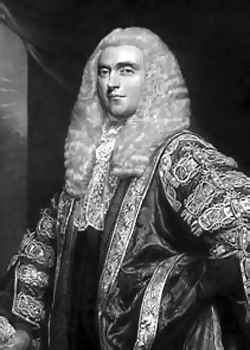Henry Addington, Viscount Sidmouth (1757-1844) (original) (raw)
 Henry Addington,
Viscount Sidmouth (1757-1844)
Henry Addington,
Viscount Sidmouth (1757-1844)
Born: 30th May 1757 at Bedford Row, Holborn, Middlesex
Speaker of the House of Commons
Prime Minister
Viscount Sidmouth
Died: 15th February 1844 at White Lodge, Richmond, Surrey
Henry Addington was the son of the Earl of Chatham's celebrated doctor, Anthony Addington, by Mary daughter and heiress of Rev. Haviland John Hiley, Headmaster of Reading School in Berkshire. He was educated first at Cheam School, followed by Winchester and Brasenose College, Oxford where he read some law before following his young friend, Pitt, into political life.
Addington sat in Parliament from 1784 and Pitt made him Speaker in 1789. He was a good and dignified but not distinguished mouthpiece of the House for eleven years, and his career is perhaps the most conspicuous instance in which private friendship betrayed the great Minister into a public mistake. This incarnate mediocrity became Pitt's successor when Pitt resigned office owing to the King's unwillingness to allow Catholic emancipation to accompany the Union with Ireland. Addington had George III's instructions to try and bend Pitt and, failing that, to take upon himself the two greatest offices of the State to be First Lord of the Treasury and Chancellor of the Exchequer. He had some difficulty in forming a Ministry and a temporary illness of the King, in 1801, let the Whigs to think they had got their chance. But this passed off and Pitt promised his support to Addington, in spite of the contempt with which his own younger followers, led by Canning, poured upon the 'Doctor,' as they christened the new Minister. It fell to Addington to negotiate the Peace of Amiens and, for a time, the success of this gave him some popularity. With the sturdy Tories, who somewhat distrusted Pitt as a reformer, he had always been, and always remained, popular. However, when the war broke out again in 1803, the 'Doctor' proved himself quite unequal to the task of conducting it. Pitt's support veered round towards coldness and, in early in 1804, to open attack, whereon Addington resigned. Before the close of 1804, Addington was reconciled to his old friend, was created a Viscount, in 1805, and held office for a few months, but they separated again in July over the resolutions against Melville.
Addington joined the Coalition after Pitt's death, but refused, in 1809, to sit upon the same bench with Canning, from whose wit he had suffered so much. He did not hold office again until 1812, when he became Liverpool's Home Secretary. In this capacity, both before and after the peace, and until his own resignation in 1821, he initiated or carried out several repressive measures against radical agitators. He was the author of the suspension of the Habeas Corpus Act, in 1817, and of the famous 'Six Acts' in 1819. He steadily opposed both Catholic Emancipation and the Reform Bill, but hardly ever came to Parliament after the death of George IV. For some years, he kept a house near his old family home in Berkshire, at Woodley Housein Woodley, but he eventually died at White Lodge in Richmond Park. Perhaps he is now best remembered by Canning's immortal epigram: Pitt is to Addington, As London is to Paddington.
Edited from CRL Fletcher's 'Historical Portraits' (1919)
